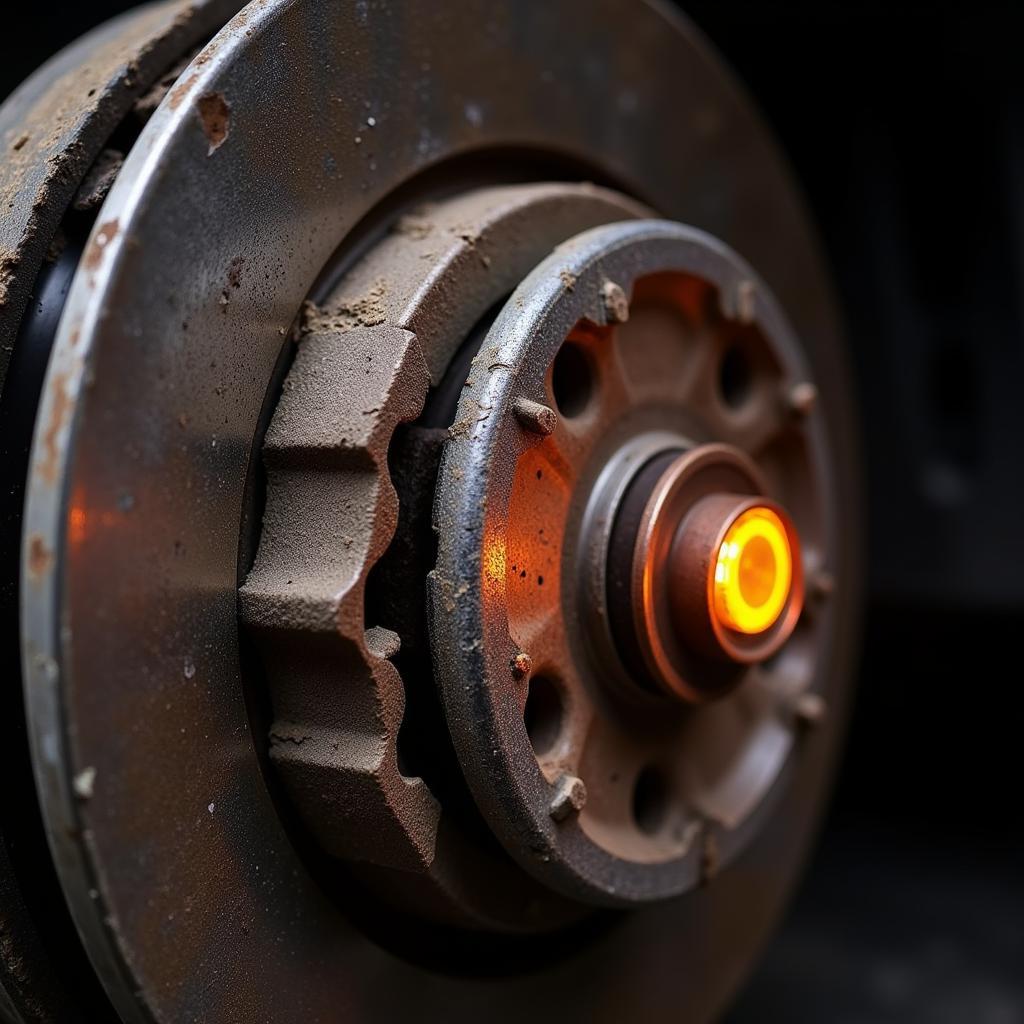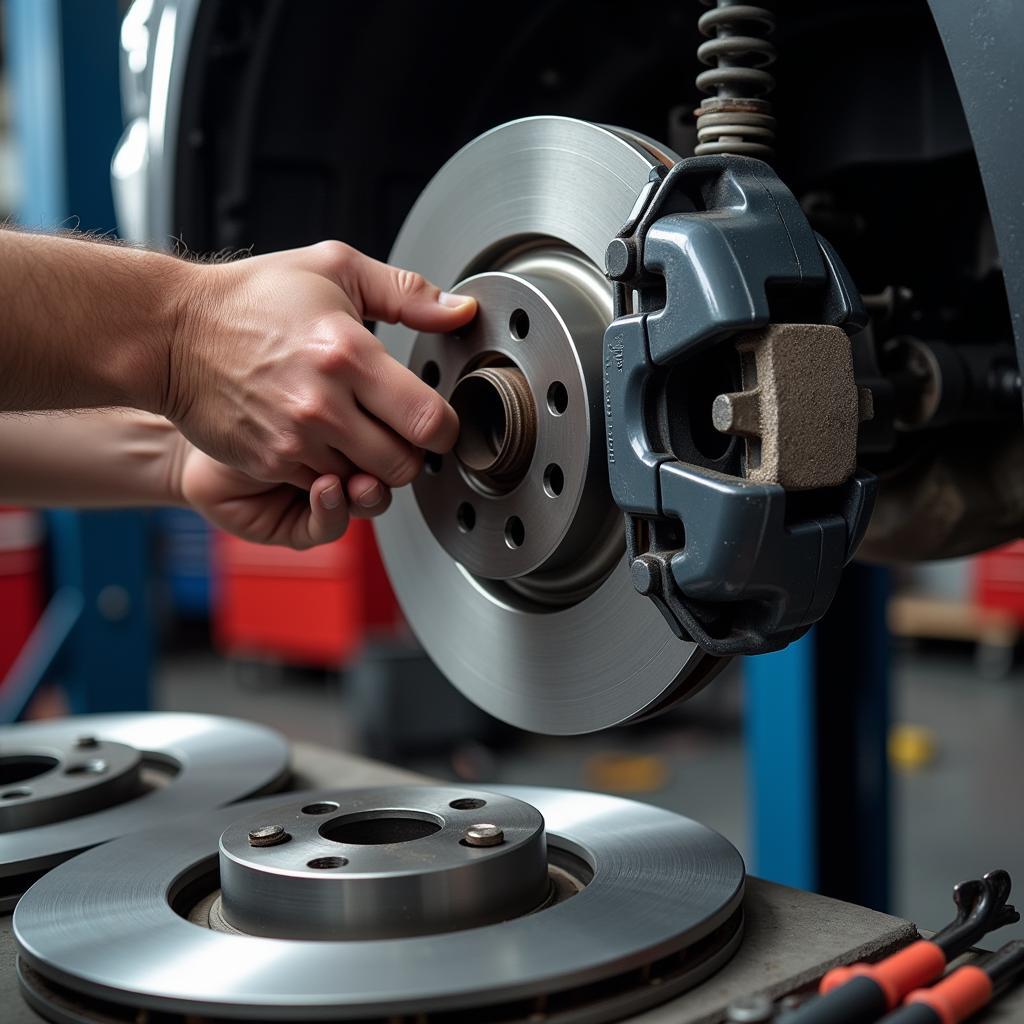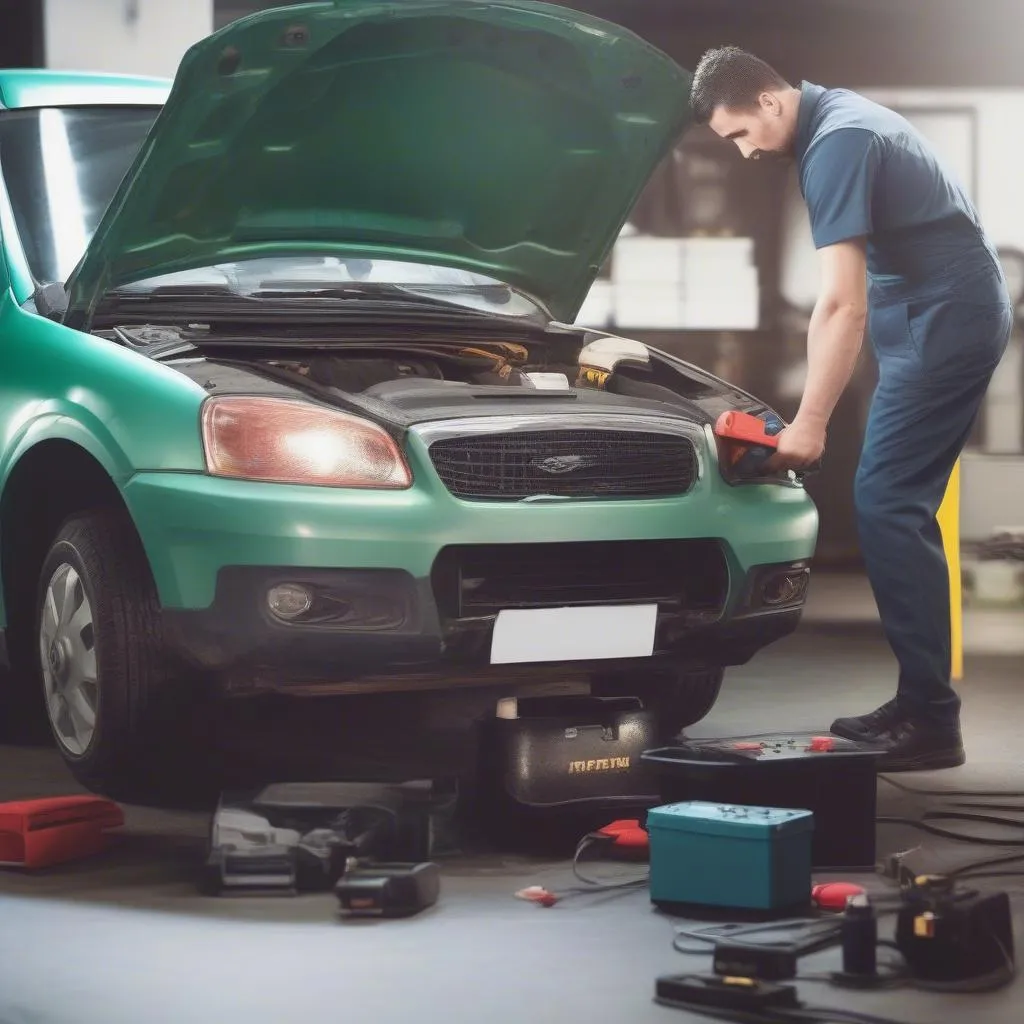The warning light on your dashboard is flashing, and your car’s diagnostic system throws up a “Warn 8409 Brake Service Kit” message. While this might trigger some initial anxiety, understanding this warning and what it entails can save you potential headaches down the road. This comprehensive guide will walk you through the ins and outs of the Warn 8409 code, empowering you to address this common automotive issue.
Understanding the Warn 8409 Code: What Does It Mean?
The Warn 8409 code specifically points towards a required replacement of your vehicle’s brake service kit. This kit typically consists of crucial components that directly impact your car’s braking system, including:
- Brake Pads: Responsible for generating the friction needed to slow down or stop your vehicle.
- Brake Rotors (or Discs): The metal discs that the brake pads clamp onto, creating the braking force.
- Brake Sensors: Electronic components that monitor the thickness of your brake pads and alert you when they wear down.
When your car displays the Warn 8409 code, it signals that one or more components within your brake service kit have reached the end of their service life and require immediate attention.
Why is Addressing Warn 8409 Critical?
Ignoring the Warn 8409 code can lead to a cascade of serious consequences. Your braking system is arguably the most critical safety feature in your vehicle, and compromising its efficiency puts you and others at risk. Here’s why addressing this warning promptly is non-negotiable:
- Compromised Braking Performance: Worn-out brake components significantly reduce your car’s ability to stop effectively, increasing stopping distances and the risk of accidents.
- Damage to Other Brake Components: Ignoring a worn-out part within the brake service kit can accelerate wear and tear on other components, leading to costlier repairs down the line.
- Safety Hazards: Driving with a compromised braking system poses a severe safety hazard, not only to you and your passengers but also to other drivers, pedestrians, and property.
What Causes the Warn 8409 Code?
Several factors contribute to the wear and tear of your brake service kit components, ultimately triggering the Warn 8409 code:
- Driving Habits: Frequent hard braking, riding the brakes, and driving in heavy traffic conditions can accelerate wear on your brake pads and rotors.
- Vehicle Usage: Vehicles used for towing, hauling heavy loads, or frequently driven in hilly or mountainous terrain tend to experience faster brake component wear.
- Environmental Factors: Driving on roads with salt, sand, or other corrosive materials can lead to premature wear of brake components.
- Time and Mileage: Like any mechanical part, brake components have a limited lifespan and require replacement after a certain period or mileage, as recommended by your vehicle manufacturer.
 Worn Brake Pads
Worn Brake Pads
Can I Still Drive My Car with the Warn 8409 Code?
While your car might still be operational with the Warn 8409 code active, it’s strongly discouraged to continue driving. As mentioned earlier, driving with compromised brakes poses significant safety risks. It’s crucial to prioritize safety and have your vehicle inspected by a qualified mechanic at the earliest opportunity.
Resolving the Warn 8409 Code: Your Options
When the Warn 8409 code pops up, you essentially have two primary options:
-
DIY Replacement: If you possess the necessary mechanical skills and tools, replacing the brake service kit yourself is possible. However, this task requires a good understanding of your vehicle’s braking system and the correct procedures.
-
Professional Mechanic: The most recommended course of action is to take your car to a certified mechanic specializing in your vehicle make and model. They have the expertise, tools, and experience to diagnose the issue accurately and carry out the replacement safely and efficiently.
What to Expect During a Brake Service Kit Replacement
A typical brake service kit replacement procedure involves the following steps:
- Inspection: The mechanic will thoroughly inspect your entire braking system, including pads, rotors, calipers, hoses, and fluid levels, to assess the extent of wear and identify any potential issues.
- Component Replacement: Based on the inspection, the mechanic will replace worn-out components, typically including brake pads, rotors, and potentially brake sensors.
- Brake Fluid Flush and Refill: Old and contaminated brake fluid can negatively impact braking performance. The mechanic will flush out the old fluid and refill the system with fresh, high-quality brake fluid.
- System Testing: After completing the replacement, the mechanic will bleed the brakes to remove any air bubbles in the system and thoroughly test the brakes to ensure optimal performance and safety.
 Brake Service Kit Replacement
Brake Service Kit Replacement
Tips to Prevent Future Warn 8409 Codes
While brake component wear is inevitable, you can prolong the lifespan of your brake service kit and reduce the frequency of encountering the Warn 8409 code by adopting these proactive measures:
- Smooth Braking Techniques: Practice smooth and gradual braking instead of slamming on the brakes whenever possible.
- Anticipate Traffic Flow: Look ahead and anticipate traffic patterns to avoid unnecessary braking and coast whenever possible.
- Maintain Proper Tire Pressure: Underinflated tires can increase rolling resistance and put additional strain on your braking system.
- Regular Vehicle Inspections: Adhere to your car manufacturer’s recommended maintenance schedule and have your brakes inspected regularly, especially if you notice any unusual noises or vibrations.
The Cost of Ignoring Warn 8409
Addressing the Warn 8409 code promptly by replacing your brake service kit might seem like an immediate expense. However, ignoring this warning can lead to far costlier consequences down the line:
- Expensive Repairs: Worn-out brake components can damage other parts of your braking system, leading to more extensive and expensive repairs.
- Reduced Vehicle Value: A history of neglected maintenance, including ignoring brake service warnings, can negatively impact your vehicle’s resale value.
- Increased Insurance Premiums: Some insurance providers may increase your premiums if they discover a history of neglecting essential vehicle maintenance, such as brake repairs.
Conclusion: Prioritize Safety, Address Warn 8409 Immediately
The Warn 8409 code is a clear signal from your car that your brake service kit needs attention. Don’t compromise on safety. Whether you choose to tackle the replacement yourself or seek professional assistance, addressing this warning promptly ensures your vehicle’s braking system operates at its best, providing you with peace of mind and a safe driving experience.


